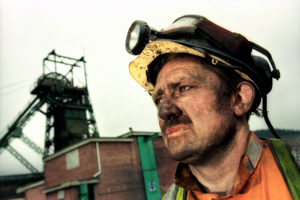The tide of industrial action rolls steadily on. Even physiotherapists are threatening to bring the country to its knees, rather than performing their usual task of setting it on its feet. Next, surely, it will be vicars, who will abandon their sermons, rip off their vestments and refuse to bury your grandmother. All this, needless to say, involves a good deal of inconvenience. You might, for example, have to stand for hours in the freezing cold holding a placard and worrying about the pay you are losing in doing so. People do such things anyway, however, since it’s inconvenient to have to walk because you can’t afford public transport, or take a second job in order to provide your children with a decent breakfast.
There’s also some lesser inconvenience to what the media calls the public, but it doesn’t usually last for long. A lot of cleaners and shelf-stackers have to put up with the inconvenience of being poor for years on end, whereas some stockbrokers are enraged by a mere two or three days of cancelled trains. The public is a mythical entity, apparently quite distinct from nurses, postmen, railway workers, junior barristers and the like. These people cause social disruption, and thus can’t be members of the public. Members of the public are the objects of such disruption, not the agents of it. A CEO is a member of the public but an ambulance driver is not.
Strikes are double-edged swords, which hurt those who deploy them. When a manager sacks or disciplines an employee, only the employee suffers, whereas workers who take industrial action may have to diminish their already slim resources in order to try to increment them. Strikes are also purely negative strategies, and trade unions largely defensive bodies. We’re a long way from peasants with pitchforks marching on the lord’s castle. Bosses have a number of positive ways of exercising power over their employees: firing them, slashing their pay, cutting their tea breaks, imposing longer hours, speeding up their work and so on. Unions, by contrast, have the single option of withdrawing their labour, which is hardly a revolutionary move. Like those who practise civil disobedience, all they can do is take a stand and cry “Enough!”, aware that they will then be travestied as wreckers and hooligans who are holding the country to ransom.
Their behaviour is not just unprincipled but unpatriotic. Theirs is a strike against the community itself, a case hard to maintain when a lot of the community are also brandishing banners. To walk away from your workbench is to be a bully and a blackmailer. Simply by sitting on your hands, rather than by storming the Treasury or kidnapping merchant bankers, you become an object of odium, not least to the affluent elite whose profits you are putting in peril. Charles Dickens travelled to Preston in the mid-19th century to observe an industrial strike at close quarters, and wrote admiringly of the reasonableness and decency of the working people involved in it. He then produced a novel called Hard Times, which contains one of the most lurid caricatures of trade unionism in Victorian England.
Nobody objects to the right to withhold one’s labour; it’s only when it starts to be effective that people fire off letters to the Telegraph. Moves by strikers to lend their cause more impact — linking up different struggles, for example, or striking at certain key moments — are regarded as seizing an unfair advantage, as though it’s bad form to overtake another runner in a marathon. By contrast, stockpiling coal to prepare for a miners’ strike, as Margaret Thatcher did, is simple common sense. The ideal, surely, is to have a strike which has no effect whatsoever, rather like having a baby that never bawls or a brand of chocolate that is both delicious and slimming.
Few civil rights have been at once so respected in theory and abhorred in practice. The first question a TV journalist tends to ask isn’t “What’s the cause of the dispute?” but “How can we stop it?” There’s an entrenched assumption that strikes, like salt or smoking, are bad in themselves — an assumption not shared by those who might benefit enough from them to switch the heating back on from time to time. You can’t ban strikes because that’s what fascist societies do, but you can’t stomach them either. Fifty years ago, it was customary to decry trade unions as too powerful; but as successive governments have bound them legislatively hand and foot, they have deprived themselves in the process of this reason for harassing them. Not that it was ever a plausible argument in the first place: the muscular capacity of trade unions is nothing compared to the power of capital.
The history of the British working-class movement is not one of wreckage and vandalism. The greatest wave of social protest in the 19th century, the Chartists, worked within the law to press for a set of reasonable reforms of the parliamentary system, almost all of which are now in operation despite being haughtily rejected at the time. Some decades later, the Suffragettes, in spite of being beaten, bludgeoned and force-fed in prison, outmatched the labour movement in their militancy. The General Strike of 1926 lasted for only nine days. From the Peterloo massacre to the dockers’ strike of 1898, there was no such reticence on the part of the British state. Instead, there is a sordid history of gagging, police and military violence, imprisonment, transportation and repressive legislation, the last of which, along with occasional outbreaks of state violence, survives to this day.
Even so, the feeling lingers that trade unionism is essentially archaic: an embarrassing hangover from the industrial past, a brake on modernisation, a throwback to the bad old days of class war. (Demanding higher wages is class warfare; refusing them is nothing of the sort.) The idea is that for all the bluster of the union bosses, they are fundamentally conservative creatures. But a dose of conservatism is just what we need. The German philosopher Walter Benjamin remarked that revolution isn’t a runaway train; it is the application of the emergency brake. He meant that it was global capitalism which is bucking out of control, and which needs to be restrained before it ruins too many lives. Working-class militants in Victorian Britain were often denounced as anarchists, but the truth is just the opposite.
What they called for was more state intervention, not less, to protect children and paupers and textile workers. The real anarchist is a market-driven society in which nobody is in charge, not even those who gather at Davos each year. (It’s appropriate that Davos is also the location for Thomas Mann’s novel The Magic Mountain, set in a sanatorium in which everyone is desperately sick.) When it comes to climate change, it is the Left who are the preservationists and the Masters of the Universe who are the vandals. Capitalism will behave antisocially if it can get away with it and if it is profitable for it to do so. Anyone who sees this as empty sloganising should take a look at food banks in the civil service, not to speak of the continuing devastation of the planet. We still haven’t thrown the brake on the runaway train.
There is a curious belief that social disruption is a bad thing in itself. Those who run the Miss World competition took this view of the feminists who noisily interrupted it some years ago, even though their protest was the only interesting aspect of the show. The young man who stood in front of a tank in Tiananmen Square in 1989 and turned himself instantly into a global icon was being politically disruptive, rather like the young women of Iran today. As a school student in Manchester, I saw Jewish men and women with yellow stars stitched on their sleeves lie down in the road to block a march by Oswald Mosley and his British Union of Fascists through a largely black area of the city. Social disruption is not only tolerable but indispensable.
It can, however, be domesticated, as it is in the figure of the Shakespearian Fool. Fools and jesters exist to tell their royal masters unacceptable truths, but wrap them up in riddle and paradox to make them more palatable. Their role is to show how everyone around them is playing a role. The difference is that the Fool knows he is playacting whereas the others don’t. But if mocking and scolding others is part of your official brief, it becomes rather more tolerable. “There’s no harm in an allow’d Fool,” remarks Olivia in Twelfth Night. You’re only doing your job, as they say. The social system is shaken but not stirred to insurrection. This institutionalised form of rebellion lives on in British politics in the form of the Parliamentary Labour Party, or more generally His Majesty’s Loyal Opposition.
Trade unions are more than just a defence against exploitation. The labour movement has traditionally seen itself as offering an alternative form of life to what we have at present, one based on cooperation rather than competition, solidarity rather than individualism. If it is engaged in the present, it also prefigures a different kind of future. How do we stop strikes? By the kind of redistribution of resources which will make them unnecessary. Otherwise we’ll carry on with the same old antithesis of private wealth and public squalor.
Disclaimer
Some of the posts we share are controversial and we do not necessarily agree with them in the whole extend. Sometimes we agree with the content or part of it but we do not agree with the narration or language. Nevertheless we find them somehow interesting, valuable and/or informative or we share them, because we strongly believe in freedom of speech, free press and journalism. We strongly encourage you to have a critical approach to all the content, do your own research and analysis to build your own opinion.
We would be glad to have your feedback.
Source: UnHerd Read the original article here: https://unherd.com/




